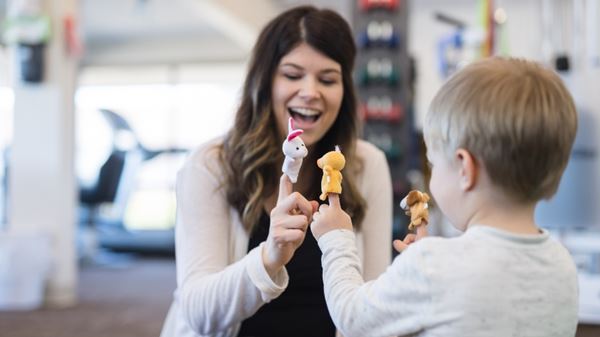For a child life specialist at Orlando Health Arnold Palmer Hospital for Children, no two days are the same. The Child Life Program offers personalized services to children and families while they are receiving care, including education, play and support. In fact, we are trained to assess and respond to the needs of all hospitalized children. Thus, our day involves working with kids of all ages who are dealing with a vast range of health issues. While our tasks and responsibilities are diverse, our main goal, no matter the child, is to support and promote wellness and resiliency.
In order to develop the best plan of action for any child, we must first consult with that child’s other medical team members. So, a typical day for a child life specialist always starts with an early morning meeting with the nurses working on a particular unit. By talking with nurses and other medical staff, we’re able to develop an updated report on a child who we’ll be working with, including background information, medical status, any potential issues they experienced during the night and a schedule for planned procedures.
As we interact with children and families throughout the day, we also must analyze and decide which patients are in need of immediate attention. The schedule of the day also depends on hospital events for children, donations, tours of the facility and other responsibilities. Through this detailed planning, we’re able to construct our daily game plan. Yes, we’re busy, but once we have our daily priorities squared away, we’re off to work, providing patient and family-centered care.
On Their Level
One of the main reasons our role in the hospital is so vital is because we help children better understand their new clinical environment, which often can be confusing, alienating or even frightening. At Orlando Health Arnold Palmer, it’s important to us that children have the most comfortable and transparent medical experience possible. So, we work to reduce stress and anxiety over an upcoming procedure, for example, or a long-term stay. The methods we use often include specialized play, but we’re also trained to communicate with children on a level that makes sense for them.
For instance, it’s common for adults to try to soothe a child by using phrases such as “don’t cry, it’s fine” or “you’re going to be okay.” While well-meaning, responding to a distressed child by dismissing their fears can lead to increased trauma or a lack of understanding on the part of the child. Instead, we interact with each child by validating their emotions and working with them to develop the strength to move forward with a procedure.
A child life specialist often will use language like, “I see that you’re upset,” “it’s okay to cry” and “what are you most scared of right now?” We’ll also kneel down to a young child’s level (instead of towering over them) and match their affect in order to reduce their wariness of meeting yet another stranger. With older children and teenagers, we’re vigilant about knocking on doors and asking for permission to enter. This demonstrates our commitment to boundaries and their right to privacy. These and numerous other behavioral tools help us best assist children visiting our hospital.
A Coping Plan
If a procedure is scheduled, we also meet with children and their families ahead of time to develop what we refer to as a “coping plan.” Research has shown the incredible importance of communicating with children before and after medical procedures in ways they understand in order to prevent PTSD. By providing education and familiarizing children with medical equipment, they are not thrust into a situation that may make them feel overwhelmed. This desensitization enables kids to feel some autonomy over their own healthcare, express themselves and also engage in some great play during the process! Facilitating fun bedside, playroom and group play are common activities in a typical day of a child life specialist.
But we aren’t just here for kids—we’re also here to support their parents. Often times, parents are hesitant to advocate for the needs of their children due to their unfamiliarity with a hospital environment. We regularly meet with families to educate them on how to advocate on behalf of their children, express their concerns and desires, and learn about and use different coping strategies.
Making It Feel Normal
Socialization is vital for children of all ages. Yet, too often, children can feel isolated during a hospital stay. The Child Life Program at Orlando Health Arnold Palmer seeks to make a child’s medical experience as “normal” and social as possible. So, a typical day may involve a variety of personalized activities, including a special event—such as a summer barbecue—or a yoga, pet or music therapy class. Overall, we provide a variety of resources to help keep children and families engaged.
While every day is different, one aspect stays the same: Every child life specialist at Orlando Health Arnold Palmer is deeply rewarded by helping a child get to feel like a child instead of a patient.
Are You Interested in Learning More About Our Child Life Program?
Our Child Life Program is dedicated to helping each child have the best healthcare experience possible through education, play and personalized support.
Learn More










